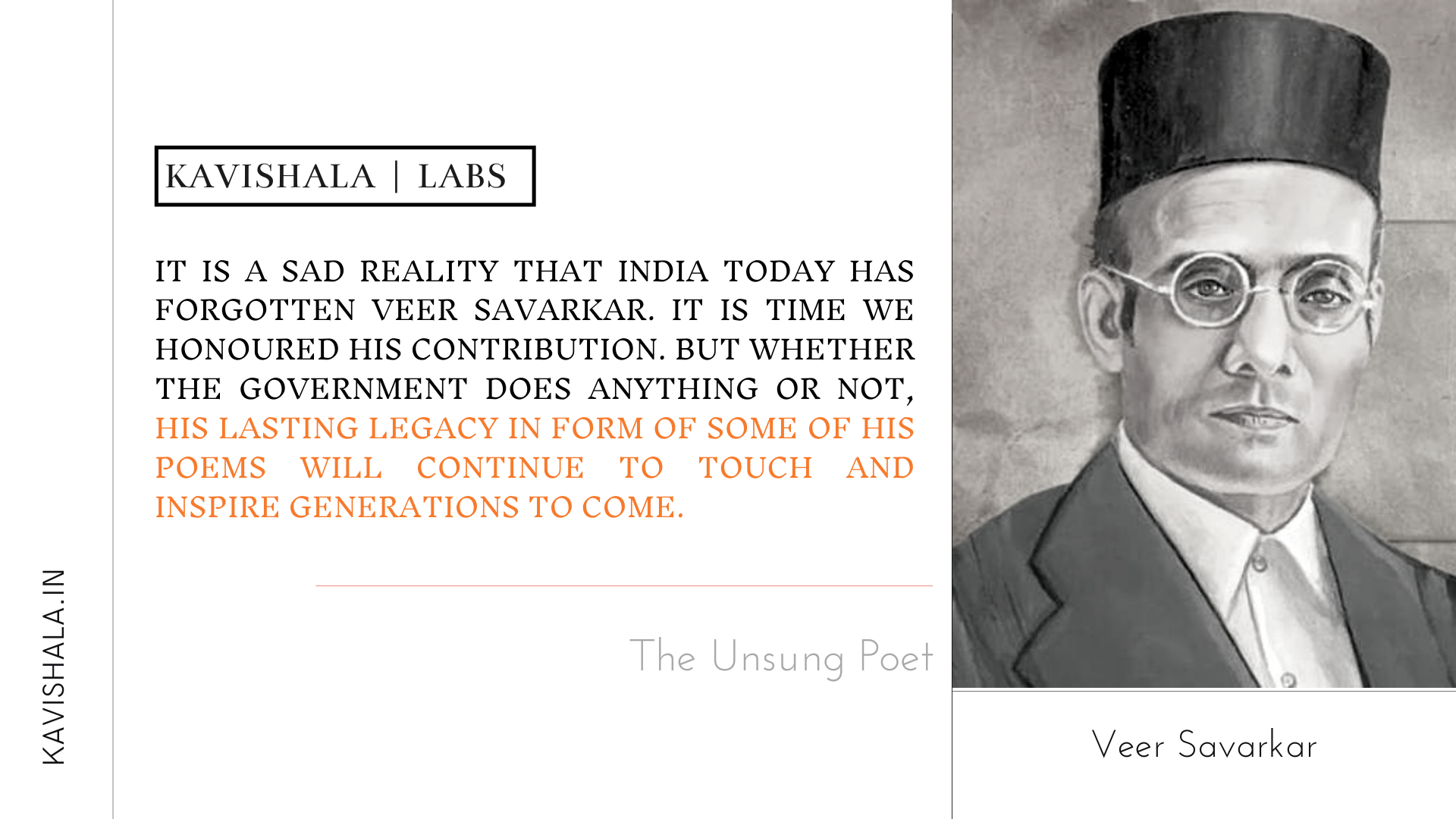
Outside Maharashtra and Marathi-speaking people, the revolutionary got little or no recognition either in the form of state honours or in society’s appreciation of his literary talent. (Via swarajya)
Most Indians know Vinayak Damodar Savarkar, popularly known as Veer Savarkar, as a freedom fighter who is often demonized for his supposed involvement in the assassination of Mohandas Karamchand Gandhi.. The Indian government after independence deliberately ignored him and did not honour him as should have been his due. As an American author said, “Sometimes your light shines so bright that it blinds people from seeing who you really are.”
It is unfortunate that very few knew that Savarkar was a poet, novelist, writer of short stories, playwright, historian and a champion of ‘purification’ of language. Savarkar’s poetry is a lasting legacy, which is known to almost each Maharashtrian. As Allen Ginsberg says, “Poetry is not an expression of the party line. It’s that time of night, lying in bed, thinking what you really think, making the private world public, that’s what the poet does.” And that is what makes Savarkar’s poems so timeless; they speak the language of the heart.
Savarkar composed his first poem “Swadeshichaphatka” at the tender age of 11 and continued writing in school and as a student in London. Some of his best works were written when he was in the Cellular Jail at the Andamans. The torture and the treatment meted out to the political prisoners – there is a story for some other day. The cruel jailor David Barry’s actions would make one wonder how someone could have conceived such ingenious ways of torture.
Savarkar wrote many books like Joseph Mazini (biography of an Italian revolutionary), 1857 Che Swantantra Samar (the first Independence struggle of India of 1857), Shikhancha Itihas (History of the Sikhs), Mazi Janmathep (a narration of his jail term in the Andamans), Sanyast Khadga (a play), Kale Pani (Black Water), Mala Kay Tyache (What is it to me), Hindutva: Who is a Hindu? and Gomantak. Savarkar’s three plays Usshaap, Sanyastakhadga and Uttarkriya are notable for their dialogues and dramatic content.
Savarkar wrote three books on history: The Indian War of Independence 1857, Hindupadpaadshaahi and Six Glorious Epochs. These books reveal his deep study of, and insight into, history, penchant for detail and inspirational but well-researched content.
Savarkar has many firsts to his credit, as far as Marathi literature goes. He was the first to compose powadas (ballads) in modern times and was the first to use modern imagery in the powadas. He was the first Marathi journalist to contribute newsletters to Marathi periodicals Londonchi baatmipatre (Newsletters from London) from foreign countries. His taarakaaspahun (gazing at the stars) is the first Marathi poem composed outside Indian shores. His Joseph Mazzini is the first Marathi book written outside India.
One of Savarkar’s songs, known to almost all Maharashtrians, is “Saagarapraantalamala” (My heart is tormented, O Ocean), written after his close associate Madan Lal Dhingra was sent to the gallows in London. The British police were keenly shadowing Savarkar, aware of his friendship with Dhingra. Dhingra’s martyrdom and the subsequent repression by British authorities took its toll on Savarkar’s health. He went to Brighton, around 50 miles south of London, to recuperate his health and remained there for 10-12 days. His associate Niranjan Pal would visit him to give him moral support. The two would frequently walk on the shores of Brighton.
On one such occasion, both of them were sitting on the seashore surrounded by dozens of mirthful English men and women. In the midst of this mirth, Savarkar was immensely sad. Sitting in front of the vast ocean, his mind was grieving at the thought of his beloved motherland. Pal described that momentous occasion 29 years later in an article, “Reminiscences of Savarkar,” dated 27 May 1938 in The Mahratta, Pune. Pal wrote, “Presently, he (Savarkar) commenced to hum a song. He sang as he composed. It was a Marathi song, describing the pitiable serfdom of India. Forgetful of all else, Savarkar went on singing. Presently, tears began to roll down his cheeks. His voice became choked. The song remained unfinished; Savarkar began to weep like a child.”
The song, immortalised by Hridaynath Mangeshkar’s lovely music and sung by the entire Mangeshkar family (Lata, Asha, Usha, Meena and Hridaynath), turns the listener emotional every time.
Dennis Gabor, Nobel Laureate and scientist, said, “Poetry is plucking at the heartstrings and making music with them.” Savarkar’s poetry, coming from the depths of his tormented soul, purified by the fire of patriotism, and tortured in the cells of Cellular Jail, had no option but to touch anyone who reads it even today, decades after the events have passed. It is the sheer intensity of the words that wouldn’t allow one to hum them without being affected.
Here are a few stanzas from “Saagara”:
नेमजसीनेपरतमातृभूमीला। सागरा, प्राणतळमळला
भूमातेच्याचरणतलातुजधूतां। मीनित्यपाहिलाहोता
मजवदलासीअन्यदेशिं चलजाऊं। सृष्टिचीविविधतापाहूं
तइंजननी-हृद् विरहशंकितहिझालें। परितुवां वचनतिजदिधलें
मार्गज्ञस्वयें मीचपृष्ठिं वाहीन। त्वरितयापरतआणीन
विश्वसलों यातववचनीं। मी
जगदनुभव-योगें बनुनी। मी
तवअधिकशक्त उध्दरणीं। मी
येईन त्वरेंकथुन सोडिलें तिजला।
सागरा, प्राणतळमळला
शुकपंजरिं वाहरिणशिरावापाशीं। हीफसगतझालीतैशी
भूविरहकसासततसाहुं यापुढती। दशदिशातमोमयहोती
गुण-सुमनेंमीं वेचियलीं ह्याभावें। कीं तिनें सुगंधाध्यावें
जरि उध्दरणीं व्ययनतिच्या हो साचा। हाव्यर्थ भारविद्येचा
सागरा, प्राणतळमळला
O Ocean, take me back to my motherland; My soul is tormented.
I had always seen you,
Washing the feet of my motherland.
You led me to a different country,
To experience the diversity of nature there.
Knowing that my mother’s heart was full of anguish,
You promised her that you would take me back;
I was reassured.
I believed that my experience of the world,
Would help me to serve her b
